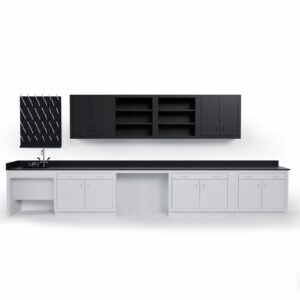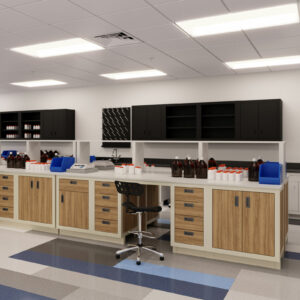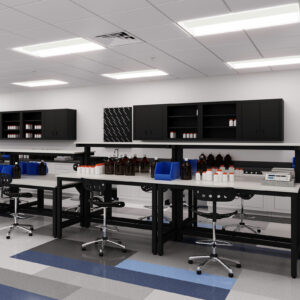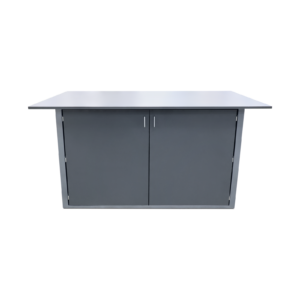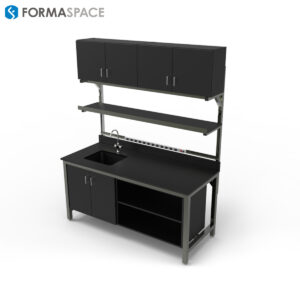Chemical Resistant Countertops
Formaspace offers a variety of chemical resistant work surfaces such as epoxy & phenolic resin countertops for wet labs. Depending on your application and budget, your Account Manager will help you select the right chemical resistant countertop for your lab project. Our tops are categorized based on their resistance to heat, corrosive chemicals, and carbon-based chemicals. Contact Formaspace today to find the perfect fit for your lab application and budget.
Please note that all the comparisons mentioned here were compiled based on product information available from product brochures and manufacturer test results applying different chemicals. Formaspace did not perform any tests under similar conditions to compare the countertops listed below.
|
|
|
|
|
||||||
|---|---|---|---|---|---|---|---|---|---|---|
| LAB APPLICATION | Heavy Duty | Moderate | Moderate | Moderate to Heavy Duty | Light Duty to Moderate | |||||
| CORROSIVE CHEMICAL RESISTANCE | High | Moderate | Moderate | Moderate | Moderate | |||||
| CARBON-BASED CHEMICAL RESISTANCE | High | Moderate | Moderate | High | Moderate | |||||
| TEMPERATURE RESISTANCE | High | Moderate | Moderate to High | High | Poor | |||||
| LEAD TIME | Long | Moderate | Longer than others | Long | Quick | |||||
| MATERIAL | Silica and resin based | Paper & resin based | Paper & resin based | Stainless Steel | Plastic based | |||||
| PRICE | ||||||||||
| SAMPLE ENVIRONMENTS | Chemical, Industrial | Medical, Clinical, Bio-science | Medical, Clinical, Bio-science | Food Service, Medical, Clinical | Marine Biology, Food & Beverage | |||||
| Read More | Read More | Read More | Read More | Read More |
|
|
|---|---|
| LAB APPLICATION Heavy Duty |
|
| CORROSIVE CHEMICAL RESISTANCE High |
|
| CARBON-BASED CHEMICAL RESISTANCE High |
|
| TEMPERATURE RESISTANCE High |
|
| LEAD TIME Long |
|
| MATERIAL Silica and resin based |
|
| PRICE |
|
| SAMPLE ENVIRONMENTS Chemical, Industrial |
|
| Read More |
|
|
|---|---|
| LAB APPLICATION Moderate |
|
| CORROSIVE CHEMICAL RESISTANCE Moderate |
|
| CARBON-BASED CHEMICAL RESISTANCE Moderate |
|
| TEMPERATURE RESISTANCE Moderate |
|
| LEAD TIME Moderate |
|
| MATERIAL Paper & resin based |
|
| PRICE |
|
| SAMPLE ENVIRONMENTS Medical, Clinical, Bio-science |
|
| Read More |
|
|
|---|---|
| LAB APPLICATION Moderate |
|
| CORROSIVE CHEMICAL RESISTANCE Moderate |
|
| CARBON-BASED CHEMICAL RESISTANCE Moderate |
|
| TEMPERATURE RESISTANCE Moderate to High |
|
| LEAD TIME Longer than others |
|
| MATERIAL Paper & resin based |
|
| PRICE |
|
| SAMPLE ENVIRONMENTS Medical, Clinical, Bio-science |
|
| Read More |
|
|
|---|---|
| LAB APPLICATION Moderate to Heavy Duty |
|
| CORROSIVE CHEMICAL RESISTANCE Moderate |
|
| CARBON-BASED CHEMICAL RESISTANCE High |
|
| TEMPERATURE RESISTANCE High |
|
| LEAD TIME Long |
|
| MATERIAL Stainless Steel |
|
| PRICE |
|
| SAMPLE ENVIRONMENTS Food Service, Medical, Clinical |
|
| Read More |
|
|
|---|---|
| LAB APPLICATION Light Duty to Moderate |
|
| CORROSIVE CHEMICAL RESISTANCE Moderate |
|
| CARBON-BASED CHEMICAL RESISTANCE Moderate |
|
| TEMPERATURE RESISTANCE Poor |
|
| LEAD TIME Quick |
|
| MATERIAL Plastic based |
|
| PRICE |
|
| SAMPLE ENVIRONMENTS Marine Biology, Food & Beverage |
|
| Read More |
Chemical Resistant Countertop Options
Epoxy Resin Countertops
Epoxy resin countertops consist of sheets cast from modified epoxy resin and non-asbestos inert fillers; compounded mixture cured and thermoset specifically from formulation to provide exceptional physical and chemical resistance required in heavy duty laboratory environments.
Applications
Epoxy resin offers the highest and most trusted standard in chemical resistance, including corrosive chemicals, and very high-temperature tolerance. Epoxy resin is extremely robust and long lasting. Epoxy countertops are commonly utilized in K-12 labs, university labs, applied science research labs, hospital labs, clinics, pharmaceutical, biomedical, molecular pathology, industrial testing or any chemical labs including oil and spectrometry.
Available Colors
ADVANTAGES
- Highest chemical resistance
- Long-lasting durability and visual appeal
- Low lifetime total cost of ownership
- Offers high flexibility for labs which may be re-tasked later
- Made in the USA
DISADVANTAGES
- Epoxy resin is made to order, and may be subject to longer lead times
- Epoxy resin is an extremely hard material, very difficult to customize or fabricate in the field.
- Very heavy, may lead to higher shipping costs.
- Installation needs to be performed by experienced personnel.
- The most common colors are black and gray. If white or another custom epoxy color is requested, the price will increase.
Phenolic Resin Countertops
Phenolic Resin is constructed of saturated melamine resin and layers of phenolic impregnated kraft paper. The melamine resin and the kraft paper form into a monolithic slab under extreme heat and pressure to create a thick, durable, compact laminate. The melamine resin produces a very durable thermoset plastic when combined with formaldehyde.
Applications
Phenolic resin is well suited for a variety of industrial and laboratory applications, such as sample processing labs, microbiology labs, agriculture, water treatment facilities, R&D or testing labs, pharmaceutical, radiology, biochemical labs, photography labs and various medical labs. Especially popular in hematology and urology labs. Phenolic resin is a non-absorbent, moderately chemical resistant, heat resistant, moisture resistant, easy to clean, extremely hard material. The core of the phenolic resin countertops is always black. Formaspace stocks phenolic resin in multiple colors, and can special order custom colors on request.
Available Colors
ADVANTAGES
- Totally nonabsorbent
- Unique appearance and high durability
- Easily modified in the field
- Resistant to moisture
- Remain stable up to 80°C of constant temperature load.
- Easy to clean
DISADVANTAGES
- Can be damaged by open flame
- Not designed for caustic chemicals
- Should not be exposed to direct sunlight, temperature over 135°C, or extreme humidity
Colorcore Phenolic Countertops
Phenolic Resin is constructed of saturated melamine resin and layers of phenolic impregnated kraft paper. The melamine resin and the kraft paper form into a monolithic slab under extreme heat and pressure to create a thick, durable, compact laminate. The melamine resin produces a very durable thermoset plastic when combined with formaldehyde.
Applications
Suitable for use on laboratory grade casework and as shelving, backsplashes, wall cladding, drawer fronts, cabinet doors, partitions and other structural components. Colorcore phenolic is particularly well suited for a variety of laboratory application settings, including sample processing labs, microbiology labs, hematology and urology labs, and more. Formaspace doesn’t stock colorcore phenolic resin and the lead time is slightly longer than standard phenolic tops.
AVAILABLE CORE COLORS
ADVANTAGES
- Higher resistance to heat compared to standard phenolic
- Lightweight, can be used for both vertical or horizontal applications.
- Totally nonabsorbent
- Unique appearance and high durability
- Easily modified in the field
- Resistant to moisture
- Made in America
DISADVANTAGES
- Can be damaged by open flame
- Not designed for caustic chemicals
- Should not be exposed to direct sunlight, temperature over 135°C, or extreme humidity
Stainless Steel Countertops
Stainless steel is low carbon steel, which contains chromium at around 10%. Chromium gives the steel its unique stainless, corrosion resistant properties. Stainless steel has especially high levels of chromium and nickel-alloy grades and is able to retain its strength at high temperatures up to 1500 F (816 C).
Applications
Stainless steel countertops are recommended for carbon-based chemical labs, biomedical, pharmaceuticals, clean rooms, and specialty settings. Stainless is easy to clean and non-absorbent; there are no pores or cracks to harbor dirt, grime, or bacteria. Stainless steel is attractive and requires minimal care. It is the greenest material Formaspace carries due its infinite design lifetime and 100%, low-energy recyclability.
ADVANTAGES
- 0% absorbency for easy cleaning
- Beautiful, timeless appearance
- 100% recyclable
- High resistance to carbon-based chemicals and fire
DISADVANTAGES
- Can be scratched
- Dents after general use
- Typically more expensive than other countertop options
High-Density Polyethylene (HDPE) Countertops
High-density polyethylene (HDPE) is best known as an FDA compliant food grade quality plastic. However, its’ resistance to acids and caustics make it a preferred countertop for labs that require chemical resistance in a soft surface. HDPE is a rigid plastic with a large strength-to-density ratio of up to 970 kg/m3. It can also hold up to 120 degrees C for short periods, 110 degrees C continuously. It also has exceptional resistance to UV rays.
Applications
High-density polyethylene (HDPE) may sound tough, but it is soft compared to other surface materials, making it great for working on delicate research subjects that can be damaged on harder surfaces. HDPE is often used in laboratory environments due to its lack of porosity and resistance to many solvents. Other applications listed are food and beverage, body product packaging, cleaning fluids, medicinal supplements, chemical resistant piping, and various biology labs.
Available Colors
ADVANTAGES
- Very soft
- Nonabsorbent
- Resistant to many solvents
- Economical alternative to other specialty surfaces
- High impact resistant
- Moisture resistant
DISADVANTAGES
- Easily scratched
- Low stiffness
- Flammable
- High thermal expansion
Testimonials

Efficient, timely and perfect furniture for our lab! We love the flexibility to never-ending changes that occur in laboratory medicine.
– L. Davis, Mission Health Hospital
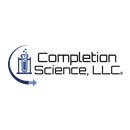
The custom design was made to fit the dimensions of our facility, along with specific sink placement, facilitates a more efficient use of space and also allows the best organization of tools and equipment.
– S. Heath, Completion Science

We placed an order for 150 mobile carts from Formaspace. These carts were designed to hold these very heavy, very expensive DNA sequencers and keep them steady while moving around the lab. They can do that, that’s why we went with Formaspace.
– S. Riedmuller, Synthetic Genomics

Very responsive. Great customer service. Extremely customizable products.
– J. Saliba, Saliba’s Extended Care Pharmacy

Great customer service. Clear communications. Stuck to timelines and product is very nice.


